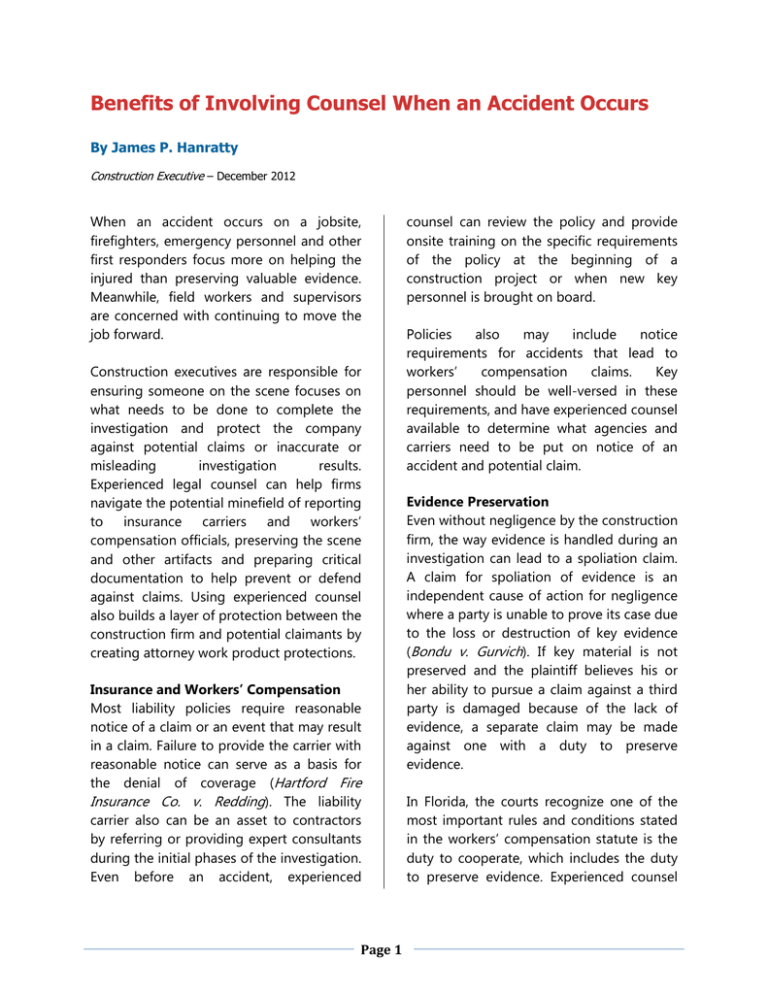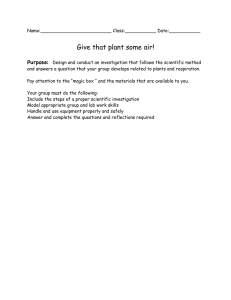
Benefits of Involving Counsel When an Accident Occurs
By James P. Hanratty
Construction Executive – December 2012
When an accident occurs on a jobsite,
firefighters, emergency personnel and other
first responders focus more on helping the
injured than preserving valuable evidence.
Meanwhile, field workers and supervisors
are concerned with continuing to move the
job forward.
Construction executives are responsible for
ensuring someone on the scene focuses on
what needs to be done to complete the
investigation and protect the company
against potential claims or inaccurate or
misleading
investigation
results.
Experienced legal counsel can help firms
navigate the potential minefield of reporting
to insurance carriers and workers’
compensation officials, preserving the scene
and other artifacts and preparing critical
documentation to help prevent or defend
against claims. Using experienced counsel
also builds a layer of protection between the
construction firm and potential claimants by
creating attorney work product protections.
Insurance and Workers’ Compensation
Most liability policies require reasonable
notice of a claim or an event that may result
in a claim. Failure to provide the carrier with
reasonable notice can serve as a basis for
the denial of coverage (Hartford Fire
Insurance Co. v. Redding). The liability
carrier also can be an asset to contractors
by referring or providing expert consultants
during the initial phases of the investigation.
Even before an accident, experienced
Page1
counsel can review the policy and provide
onsite training on the specific requirements
of the policy at the beginning of a
construction project or when new key
personnel is brought on board.
Policies
also
may
include
notice
requirements for accidents that lead to
workers’
compensation
claims.
Key
personnel should be well-versed in these
requirements, and have experienced counsel
available to determine what agencies and
carriers need to be put on notice of an
accident and potential claim.
Evidence Preservation
Even without negligence by the construction
firm, the way evidence is handled during an
investigation can lead to a spoliation claim.
A claim for spoliation of evidence is an
independent cause of action for negligence
where a party is unable to prove its case due
to the loss or destruction of key evidence
(Bondu v. Gurvich). If key material is not
preserved and the plaintiff believes his or
her ability to pursue a claim against a third
party is damaged because of the lack of
evidence, a separate claim may be made
against one with a duty to preserve
evidence.
In Florida, the courts recognize one of the
most important rules and conditions stated
in the workers’ compensation statute is the
duty to cooperate, which includes the duty
to preserve evidence. Experienced counsel
can help contractors properly protect and
document evidence to avoid a spoliation
claim in the future, but legal representatives
are required to be on the scene as soon as
possible to recognize and preserve key
evidence.
Protected Investigation
Involving legal counsel at the initial stage of
an investigation also can provide a
construction firm with crucial legal
protections. The primary shield against
disclosure of investigation results is the
attorney work product protection.
The rules of civil procedure broadly allow
parties to obtain discovery of any matter
that is relevant to the subject matter of the
pending action, whether the discovery
would be admissible at trial or is reasonably
calculated to lead to the discovery of
admissible evidence. This broad scope of
discovery in civil actions can permit
opposing parties to obtain results of
investigations, including internal incident
reports (unless they are privileged). If
information qualifies for protection as work
product, a party seeking discovery may
obtain disclosure of such information only
by showing a need and undue hardship to
obtain the materials through other means.
originally, the work product privilege
applied to documents and other tangible
things prepared in anticipation of litigation
or for trial. However, the work product of an
attorney also is reflected in many ways,
including
interviews,
statements,
memoranda, correspondence, briefs, mental
impressions and personal beliefs.
In order to enjoy the benefits of this
privilege, the information must be prepared
in anticipation of litigation. Courts have
determined incident reports may be
prepared for a purpose other than in
anticipation of litigation; when this is the
case, the reports are not work product.
While the law does not require attorney
involvement in the investigation to establish
the work product protections, involving
counsel at the onset of the investigation can
help demonstrate the documents and other
investigatory materials were prepared in
anticipation of litigation.
Working with experienced counsel can
provide a level of control to the otherwise
chaotic environment surrounding an injuryinducing accident. Counsel serves as a key
asset in the investigation of the accident,
the safety of workers and the company’s
protection from claims.
______________________________________________________________________________________________________
James P. Hanratty is a shareholder with the Jacksonville, Fla., office of Marshall Dennehey
Warner Coleman & Goggin. For more information, call (904) 358-4208 or email
jphanratty@mdwcg.com.
______________________________________________________________________________________________________
Reprinted with permission from Construction Executive, December 2012, a publication of Associated
Builders and Contractors Services Corp. Copyright 2012. All rights reserved.
Page2


